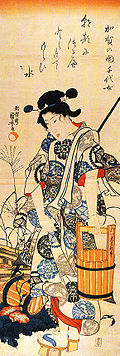
Chiyo-ni
Encyclopedia

Japanese people
The are an ethnic group originating in the Japanese archipelago and are the predominant ethnic group of Japan. Worldwide, approximately 130 million people are of Japanese descent; of these, approximately 127 million are residents of Japan. People of Japanese ancestry who live in other countries...
poet
Poet
A poet is a person who writes poetry. A poet's work can be literal, meaning that his work is derived from a specific event, or metaphorical, meaning that his work can take on many meanings and forms. Poets have existed since antiquity, in nearly all languages, and have produced works that vary...
of the Edo
Edo
, also romanized as Yedo or Yeddo, is the former name of the Japanese capital Tokyo, and was the seat of power for the Tokugawa shogunate which ruled Japan from 1603 to 1868...
period, widely regarded as one of the greatest female haiku
Haiku
' , plural haiku, is a very short form of Japanese poetry typically characterised by three qualities:* The essence of haiku is "cutting"...
poets.
Biography
Born in MattoMatto, Ishikawa
was a city located in Ishikawa Prefecture, Japan.In 2003, the city had an estimated population of 66,520 and a population density of 1,109.96 persons per km²...
, Kaga Province
Kaga Province
was an old province in the area that is today the southern part of Ishikawa Prefecture. It was sometimes called .Ruled by the Maeda clan, the capital of Kaga was Kanazawa. Kaga bordered on Echizen, Etchū, Hida, and Noto Provinces...
(now Hakusan
Hakusan, Ishikawa
is a city located in Ishikawa, Japan.The city was founded on February 1, 2005 from the merger of the city of Mattō with seven towns and villages from Ishikawa District. As of April 1, 2008 population data, the city has an estimated population of 110,654 and a density of 147 persons per km²...
, Ishikawa Prefecture
Ishikawa Prefecture
is a prefecture of Japan located in the Chūbu region on Honshū island. The capital is Kanazawa.- History :Ishikawa was formed from the merger of Kaga Province and the smaller Noto Province.- Geography :Ishikawa is on the Sea of Japan coast...
) as a daughter of a picture framer, Chiyo-ni began writing haiku poetry aged 7. By the age of 17, she had become very popular all over Japan for her poetry. Her poems, although mostly dealing with nature
Nature
Nature, in the broadest sense, is equivalent to the natural world, physical world, or material world. "Nature" refers to the phenomena of the physical world, and also to life in general...
, work for a unity of nature with humanity. Her own life was that of the haikai
Haikai
Haikai is a poetic genre that includes a number of forms which embrace the aesthetics of haikai no renga, and what Bashō referred to as the "poetic spirit" , including haiku, renku , haibun, haiga and senryū ."Haikai" is sometimes used as an abbreviation for "haikai no...
poets who made their lives and the world they lived in one with themselves.
Chiyo-ni's teachers were the students of Bashō, and she stayed true to his style, although she did develop on her own as an independent figure. Today, the morning glory
Morning glory
Morning glory is a common name for over 1,000 species of flowering plants in the family Convolvulaceae, whose current taxonomy and systematics is in flux...
is a favorite flower for the people of her home town, because she left a number of poems on that flower.
After becoming a nun, Chiyo took the Buddhist name, Soen.
She is perhaps best known for this haiku:
morning glory!
the well bucket-entangled,
I ask for water
(trans. Donegan and Ishibashi)
Shokouji temple in Hakusan
Hakusan, Ishikawa
is a city located in Ishikawa, Japan.The city was founded on February 1, 2005 from the merger of the city of Mattō with seven towns and villages from Ishikawa District. As of April 1, 2008 population data, the city has an estimated population of 110,654 and a density of 147 persons per km²...
contains a display of her personal effects.
In popular culture
The American rock band Red House PaintersRed House Painters
Red House Painters were an alternative rock group formed in 1989 in San Francisco, California by singer-songwriter Mark Kozelek.-History:While in Atlanta, Georgia, Ohio-born Kozelek became friends with Anthony Koutsos, a drummer. He then moved to San Francisco, California, adding guitarist Gorden...
adapted one of Chiyo's haiku for the chorus of their song "Dragonflies".
External links
- O Mabson Southard and Chiyo-ni: Masters of Buddhist Tradition by Brock Peoples at Millikin UniversityMillikin UniversityMillikin University is an American co-educational, comprehensive, private, four-year university with traditional undergraduate programs in arts and sciences, business, fine arts, and professional studies, as well as non-traditional, adult degree-completion programs and graduate programs in...
- Pamela Miller Ness and Chiyo-ni: A Comparison of Two Women Haiku Authors by Joan Leach at Millikin University
- With Liquid Voice Unendingly a renku by Chiyo and Sue Jo, translated by Lenore Mayhew and William McNaughton in Modern Haiku, XIV:2, 1983
- Morning Glories! (朝がはや Asagao ya) a renku by Chiyo and Suejo, translated by John Carley, in Simply Haiku, v7n3, 2009
- The Wasi of ChiyoNi Ishi at ancientworlds.com
- Chiyo-ni's Haiku Style Excerpts from Chiyo-ni: Woman Haiku Master, by Patricia Donegan, in Simply Haiku, v2n3, 2004

